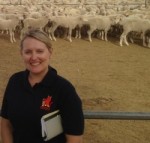Kelly Manton-Pearce
Nuffield Scholar, Research Fellow, Murdoch University and member of TATT Global Farmer Network
Expert Bio
Dr. Kelly Manton-Pearce, along with her husband Alan, grow canola, wheat, barley, oaten-hay and sheep in Western Australia. In addition to farming, Kelly is a Nuffield Scholar, Research Fellow with Murdoch University and a member of the TATT Global Farmer Network.
Studies, Articles and Answers
Showing 1 out of 1 results
Question
Q: do you think GM foods are more harmful or helpful?
A: There is currently a debate in our state to remove legislation that restricts the growing of GM food. I hope it’s overturned: Farmers in Western Australia should enjoy all the tools of modern agriculture, especially the ones that have proven so popular and effective in the Western hemisphere, from Canada in the north to Argentina in the south. This would represent progress. Unfortunately, we may have to endure regress. The states of South Australia and Tasmania continue to ban GM farming. If a Labor government comes to power in the next Western Australian state election they have [...]
A: The following responses are excerpts of farmer perspectives about GM crops that can be used for food, which were shared by the Truth About Trade & Technology Global Farmer Network. [...]
A: In Tanzania, researchers have figured out how to improve the cassava through biotechnology—a development that everyone ought to celebrate and promote. This progress comes at a good time because the cassava brown-streak virus has become the leading threat to food security in many parts of East Africa. One study says that the disease can slash a farm’s productivity by as much as 70 percent. When it strikes, many smallholder farmers simply abandon their fields—and each time that happens, Africa’s dire food problems grow a little bit worse. Biotechnology offers a potentia [...]
A: Years ago, India accepted biotechnology in agriculture when it commercialized GM cotton. At that moment, it looked like we might become full participants in a new wave of progress. Today, more than 95 percent of India’s cotton is genetically modified to resist insect pests. This was a welcome start, but small in scale. Only a tiny minority of India’s farmers grows cotton. The rest of us produce other crops, and are yet to taste the benefit of GM crops as we try to feed a nation of more than 1.2 billion people. Yet as farmers in North and South America pressed forward [...]
A: Since citrus greening showed up about a decade ago, Florida’s orange production has fallen by about half—and if it falls much more, the citrus business may become economically unsustainable. Our oranges won’t come from Florida anymore. More than orange juice is at stake. After squeezing, a lot of the leftover pulp becomes feed for my cattle—not only is it good for them, but it allows us to use citrus in multiple ways. Nothing goes to waste, in accordance with the principles of sustainable agriculture. Growers have tried to fight citrus greening in every way imaginable [...]
GMO Basics Health & Safety